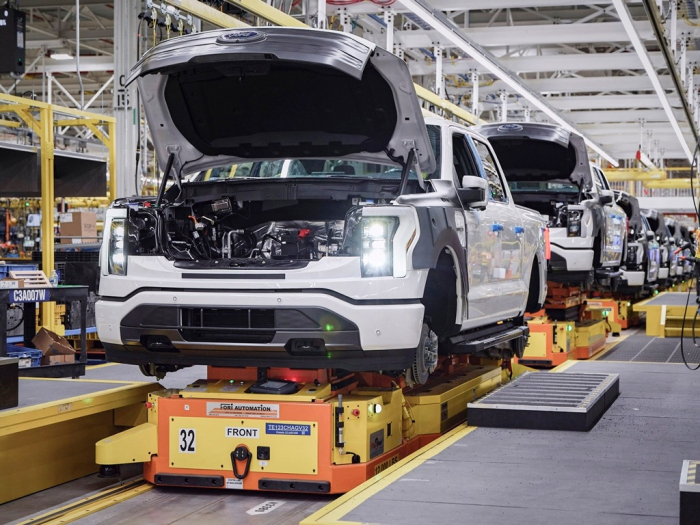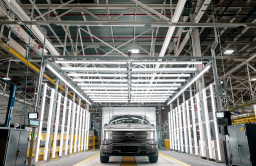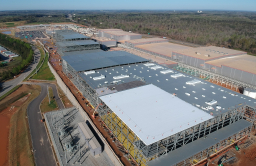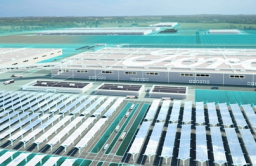-
KOSPI 2577.27 -2.21 -0.09%
-
KOSDAQ 722.52 -7.07 -0.97%
-
KOSPI200 341.49 +0.02 +0.01%
-
USD/KRW 1396 -2.00 0.14%
SK On resumes Ford F-150 Lightning battery production line
Batteries
SK On resumes Ford F-150 Lightning battery production line
The South Korean battery maker suspended the line on Feb. 5 after an electric pickup caught on fire during inspection
By
Feb 21, 2023 (Gmt+09:00)
2
Min read
News+

SK On Co., the world’s fifth-largest battery maker, on Monday resumed operations of the cell production line for Ford Motor Co.’s electric pickup F-150 Lightning, easing concerns over the product quality of the South Korean company.
SK On halted the production line at its electric vehicle battery plant in the US state of Georgia on Feb. 5 after an F-150 Lightning caught on fire when Ford was conducting pre-delivery quality inspections.
“The incident was not an issue about source technology but a problem related to facilities and manufacturing operations,” said an SK On official in Seoul. “We established measures to prevent the recurrence of such incidents and have applied them to the production line.”
The production line may have been suspended due to human error during the manufacturing process as the company restarted the line in 15 days without any change in the plant’s facilities and equipment, industry sources in Seoul said.
The restart of the production line has alleviated quality concerns about SK On’s batteries, helping shares of its parent SK Innovation Co. rise 2.14% in the South Korean stock market with the main Kospi up only 0.16%.
Ford is also expected to resume production and shipments of the F-150 Lightning in the near term, following the restart of SK On’s cell production line, sources in South Korea said. The US automaker had predicted the issue to be solved in weeks, according to the sources.
The first US electric light pickup is equipped with nickel-cobalt-manganese batteries produced at the battery maker’s US plant.
SK INNOVATION TO INJECT $1.6 BN TO JV WITH FORD
SK Innovation separately said on Tuesday it is set to inject $1.6 billion into BlueOval SK LLC, its joint venture with Ford in the US, a part of its long-term investment plan for the world’s third-largest EV market.
In September 2021, SK Innovation said it decided to spend $4.45 billion, equivalent to its 50% stake in BlueOval SK, on the construction of the JV’s plants.
Last year, SK Battery America Inc., SK On’s US unit, provided $690.8 million as the first batch of the investment.
The JV is building an assembly and battery plant in Tennessee, and two other battery factories in Kentucky, which will mark the single largest investment in Ford's 118-year history.
The BlueOval SK plants, set to open in 2025, will be the largest ever in the US.
The three factories will have an annual production capacity of 129 gigawatt-hours (GWh), enough to supply 2.15 million EVs a year.
Write to Hyung-Kyu Kim at khk@hankyung.com
Jongwoo Cheon edited this article.
More To Read
-
Feb 15, 2023 (Gmt+09:00)
-
Sep 28, 2021 (Gmt+09:00)
-
Jul 14, 2022 (Gmt+09:00)





